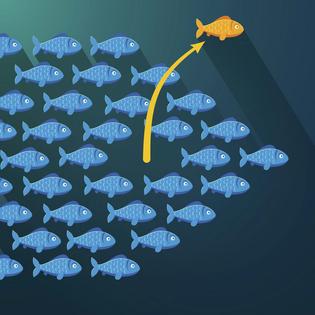Stop and think: An undervalued approach in a world that short-circuits thoughtful political judgment
Published in Political News
When’s the last time you saw a pundit pause?
When President Joe Biden pardoned his son Hunter, who was convicted of three felony charges, the pardon was startling because Biden repeatedly pledged before the election that he would respect the federal jury’s conviction.
As the news broke of the president’s decision, liberal political analyst Molly Jong-Fast was asked on live television for a “fast and furious” reaction to the pardon of Hunter Biden.
Jong-Fast paused for a moment, then said, “I just heard it. I have to process it. I don’t have a take. I’m sorry.”
That became a story. Several news outlets adopted the Fox News headline that a prominent liberal commentator was rendered “speechless,” “gobsmacked” by the pardon. The next day, conservative commentator Megyn Kelly featured the clip on her Sirius XM program as a “very fun example” of liberal hypocrisy.
But Jong-Fast wasn’t speechless. She said she hadn’t yet formulated a response and needed time to do so. This is a responsible position to take in the midst of breaking news.
Yet it was treated as a political failing.
The negative reaction to Jong-Fast’s caution reveals a troubling trend in American democracy. People are captivated by the “hot take,” the “call out,” the “clap back,” the immediate verdict. That makes for shallow analysis that largely repeats familiar ideas.
But responsible political judgment requires reflection, and reflection takes time.
As I argue in my new book “Civic Solitude: Why Democracy Needs Distance,” the trouble is that our social environments are primed to short-circuit our thinking. They engage our reflexes while suppressing our judgment.
Here’s how. We humans are all subject to a cognitive dynamic known as belief polarization. This is the tendency for individuals to adopt more extreme perspectives as a result of their interactions with like-minded peers. When we shift toward more radical views, we become more inclined to dismiss anyone who does not agree with us as ignorant, irrational and devious.
But that’s not all. Our more extreme selves are also more “groupish” – that is, more conformist, more eager to fit in with our peers.
In other words, as we become more polarized in our beliefs, we become more invested in asserting our status within our group. We become hardliners and thus less tolerant of deviation among our allies.
As belief polarization escalates, we feel more pressure to conform. Hesitation begins to look like disloyalty. Even a momentary reluctance to affirm the party line signals to allies that our commitment to the group is wavering. Accordingly, we become more inclined simply to adopt the opinions that are popular among our peers – we decide what to think by mimicking our allies.
Meanwhile, our associates are subject to the same dynamics. The result is groupthink, where a network of like-minded people come to express opinions that have their source in groupish dynamics rather than facts and evidence.
Add to this that our everyday social environments are increasingly segregated along partisan lines. It is no exaggeration to say that in the United States today, opposing partisans live in different social worlds.
For example, liberals and conservatives live in different kinds of neighborhoods, shop at different stores, purchase different products, drive different vehicles, express different aesthetic preferences, work in different occupations and form different kinds of family groups. They eat different foods. They understand words differently, and even exhibit different patterns of pronunciation.
The familiar narrative of “red” and “blue” states goes far deeper than geography. In the United States today, political affiliation is more of a lifestyle than an outlook on the purposes of government.
Our day-to-day lives are saturated with triggers of our partisan group loyalties. These conditions then trigger the groupish dynamics of belief polarization. This in turn means that we’re primed to act quickly in conformity with perceived group expectations, while also being less disposed to step back and think for ourselves.
To be clear, as a philosopher who focuses on democracy and civic ethics, I know that democracy needs engaged citizens. It is our duty to be civically vigilant, to be involved in the processes that shape political circumstances.
No doubt, the free press plays a central role in democracy. Reporters, pundits and analysts keep us informed while also providing their various perspectives on political matters.
However, it is possible to overemphasize the active elements of democracy. The demand for fast and furious judgment is a call for democracy conducted by partisan talking points and scripted taglines. It’s as if all of life were to be conducted in a spin room.
No less crucial for the democratic project is a citizenry that is thoughtful and reflective. This means that we cannot always rely on our familiar partisan reflexes. Especially when dealing with an unexpected political development, we need to step back and revise our stance.
But thought and reflection take time. Our current modes of politics allow for neither.
Jong-Fast’s reaction was no democratic failure. It was an affirmation of one of democracy’s most important civic values: reasoned judgment.
This article is republished from The Conversation, a nonprofit, independent news organization bringing you facts and trustworthy analysis to help you make sense of our complex world. It was written by: Robert B. Talisse, Vanderbilt University
Read more:
Political polarization is about feelings, not facts
Democratic and Republican voters both love civility – but the bipartisan appeal is partly because nobody can agree on what civility is
Liz Cheney trounced: ‘Black sheep effect’ and GOP partisan identity explain her decisive defeat after criticizing Trump
Robert B. Talisse does not work for, consult, own shares in or receive funding from any company or organization that would benefit from this article, and has disclosed no relevant affiliations beyond their academic appointment.
































































Comments